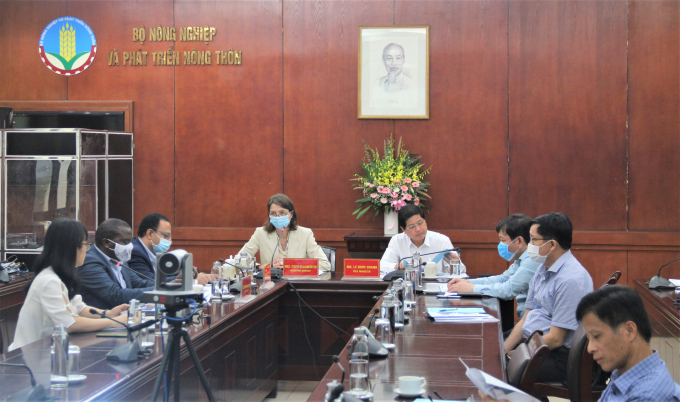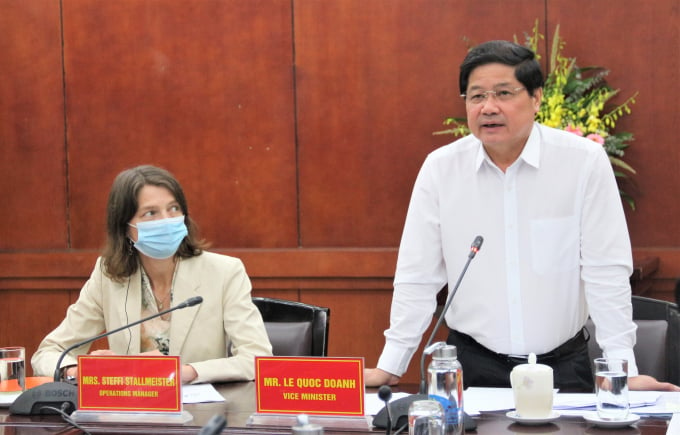May 23, 2025 | 04:09 GMT +7
May 23, 2025 | 04:09 GMT +7
Hotline: 0913.378.918
May 23, 2025 | 04:09 GMT +7
Hotline: 0913.378.918

Overview of the conference. Photo: Pham Hieu.
After five years, the implementation of the VnSAT projects achieved successful results in general, however, the disbursement activities have met some difficulties due to both subjective and objective reasons. Accordingly, the Ministry of Agriculture and Rural Development (MARD) has worked closely with the World Bank to propose extending the project by one and a half years to continue to replicate the model in terms of technology, and further improve the output as well as elevate the project to a type of its kind to share with other countries.
At the conference, Deputy Minister Le Quoc Doanh proposed localities to complete fully the output target, perhaps even exceeding 5-10% to clarify the achieved results and goals of the project. Paying special attention to economic criteria such as the added value of the area, the number of people participating in training on technical application, especially emission reduction and environmental factors, is seeing great attention from the World Bank.
Besides, the Deputy Minister also demanded to solve the shortcomings of 133 stage-1 and stage-2 projects while asking localities to continue training and duplicate some proper models of "3 decrease, 3 increase", coffee farming among others associating with the common goal of economic profit, increasing people's income and stabilizing the environment and society.
According to Le Van Hien, the Head of Management Board of Agriculture project, the deadline of VnSAT is soon to come while the workload to complete all 117 subprojects is abundant.
In recent times, MARD has regularly directed the Management Board and related departments to coordinate with provinces to accelerate progress in the context of the Covid-19 pandemic. So far, the progress of work compared to the requirements of the 10th World Bank review team is 30 days behind. Due to the outbreak of the Covid-19 pandemic, the design consulting teams could not access directly to relevant areas.
He affirmed that the Board had a regular meeting and working session with the provincial level to divide the workload into two groups including one-step design sub-projects, easy to construct, less affected by weather as well as ground, which need to be organized bidding in July 2021, awarding tenders in August and September 2021 and there are about 9 months left to construct these items.
The second group includes 2-steps subprojects, accounting for 10 in 117 subprojects. In which, the rice component has 1 sub-project of An Giang province that is being designed and approved in July 2021, if it is done quickly, it will be possible to bid in August and September.
For Central Highlands, there are 9 subprojects, four of Dak Nong, 2 of Kon Tum, and the remaining from Dak Lak. Up to now, the Management Boards of these three provinces have basically concluded the design dossiers and waiting for approval in August 2021.
“Some people argued that the 2-step design may delay the loan closing time. However, these items are only about 1 month behind the request. The main items are traffic roads, so the construction is quite convenient,” Le Van Hien informed.

The conference to review the support for the implementation of the Sustainable Agriculture Transformation Project in Vietnam (VnSAT) was co-chaired by Deputy Minister Le Quoc Doanh and Project Operations Manager of VnSAT Steffi Stallmeister. Photo: Pham Hieu.
Speaking at the conference, Steffi Stallmeister, Project Operations Manager of VnSAT, representative of the World Bank, assessed that the VnSAT project has been successfully implemented thanks to the close coordination between units of MARD and the provinces participating in the project. The project's main objective is to improve productivity and increase the income of farmers through which benefits nearly 1 million people.
The World Bank representative said: “We must protect the environment, respond to climate change, and at the same time increase farmers' incomes. The VnSAT project proves that we will achieve both of these goals simultaneously.”
She expected that during 12 months of extension of the project, the capital of USD60 million will be disbursed for the next activities, thereby helping to improve the efficiency of the project.
“However, if we do not fully disburse this capital, we need to make an early decision to cancel the standing-by capital and then transfer that money to other projects in Vietnam, maybe even to another project of MARD,” Stallmeister said.
![Reducing emissions from rice fields: [2] Farmers’ commitment to the soil](https://t.ex-cdn.com/nongnghiepmoitruong.vn/608w/files/news/2025/05/05/dsc08881jpg-nongnghiep-140632.jpg)
(VAN) Clean rice cultivation model in Thuong Tan commune, Bac Tan Uyen district, is assisting local residents in achieving sustainable agriculture by substantially reducing costs, increasing productivity, and protecting the environment.

(VAN) At the conference to disseminate Resolution No. 68, AgriS introduced its digital agricultural ecosystem and reaffirmed its commitment to accompanying the Government in promoting private sector development and sustainable agriculture.

(VAN) 'Blue Ocean - Blue Foods' initiative is designed to restore marine ecosystems and establish sustainable livelihoods for local communities by cultivating a minimum of 1,000 hectares of cottonii seaweed in the first three years.
/2025/05/21/4642-3-112707_603.jpg)
(VAN) The V-SCOPE project has made direct contributions to three out of six pillars of the Comprehensive Strategic Partnership between Vietnam and Australia.

(VAN) Facing the threat of rabies spreading to the community, Gia Lai province urgently carries out measures to vaccinate dogs and cats on a large scale.

(VAN) Disease-free livestock farming not only protects livestock herds but also stabilizes production and livelihoods for many farmers in Tuyen Quang.

(VAN) Japan's grant aid project contributes to capacity building, promoting organic agricultural production, and fostering sustainable community development in Dong Thap province.